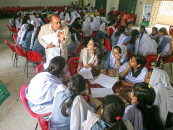Cultural show for a cause
GECA organised a fund raising charity cultural function for the affected people of Attabad disaster.

Noted writer and thinker, Ashfaq Saleem Mirza, who chaired the meeting, emphasised the need to save the ancient language from extinction and regarded the publication of the book and the GECA efforts as a step in that direction. The book has been translated from the French by Karim Khan.
An Urdu musical album ‘eltija’ dedicated to the affected people of Attabad disaster was also released. Its sale proceeds will be spent on the education of students of the disaster affected area residing in Islamabad and Rawalpindi. Another album in Wakhi language titled veer was also released.
Ashfaq Salim Mirza called for taking serious measures for preservation of the Wakhi language. He said Wakhi was one of the oldest languages of Central Asia and was
also known as an old form
of Persian.
Wakhi was spoken in China, Tajikistan and Afghanistan besides Hunza-Gojal and Broghel valley of Chitral.
He said that the dilemma of the Wakhi language was that despite being spoken in four countries it had no common script. “Script is the very foundation that guarantees life of a language and no language can survive for long time without a script,” he added.
He said a lot of research work was being done on Wakhi language in the universities of America and Europe while the local indigenous population had contributed very little for their language.
“Karim’s book is the first drop of rain that heralds literary contribution by the local Wakhi people for their language” he observed.
Earlier, GECA Chairman, explaining the objective of the event, said that the Wakhi Pamiri people were known for their peaceful nature and hospitality. He said the language was at the verge of extinction.
“Wakhi has no script and it exists only in oral form. Its usage has decreased after Wakhi people’s exposure to the outside world through the media and migration to the urban centres, which
has endangered the rich Wakhi Pamiri culture,”
he added.
He said GECA was striving for the revival and preservation of Wakhi language and culture.
Traditional folk music and skits depicting changing lifestyle and values of Wakhi people were presented by youth and applauded by the audience.
The event was attended by a large number of people from Gojal valley residing in the twin cities.
Students danced to the tune of dadang (drum) damal (percussion) and gabbi (flute) played by noted artist Niaz Habib and his team.
Famous Wakhi singers Doulat Wali Baig, Kashif Sakhi and Suhail Rumi and others from the area sang their popular numbers and enthralled the audience.
Published in The Express Tribune, November 23rd, 2010.
A fund raising charity cultural function for the affected people of Attabad disaster featured the launching of a book Lets Speak Wakhi which is an English translation
of a book in French. The function was organised by the Gojal Educational and Cultural Association (GECA) Islamabad at the Lok Virsa here on Saturday.
Noted writer and thinker, Ashfaq Saleem Mirza, who chaired the meeting, emphasised the need to save the ancient language from extinction and regarded the publication of the book and the GECA efforts as a step in that direction. The book has been translated from the French by Karim Khan.
An Urdu musical album ‘eltija’ dedicated to the affected people of Attabad disaster was also released. Its sale proceeds will be spent on the education of students of the disaster affected area residing in Islamabad and Rawalpindi. Another album in Wakhi language titled veer was also released.
Ashfaq Salim Mirza called for taking serious measures for preservation of the Wakhi language. He said Wakhi was one of the oldest languages of Central Asia and was
also known as an old form
of Persian.
Wakhi was spoken in China, Tajikistan and Afghanistan besides Hunza-Gojal and Broghel valley of Chitral.
He said that the dilemma of the Wakhi language was that despite being spoken in four countries it had no common script. “Script is the very foundation that guarantees life of a language and no language can survive for long time without a script,” he added.
He said a lot of research work was being done on Wakhi language in the universities of America and Europe while the local indigenous population had contributed very little for their language.
“Karim’s book is the first drop of rain that heralds literary contribution by the local Wakhi people for their language” he observed.
Earlier, GECA Chairman, explaining the objective of the event, said that the Wakhi Pamiri people were known for their peaceful nature and hospitality. He said the language was at the verge of extinction.
“Wakhi has no script and it exists only in oral form. Its usage has decreased after Wakhi people’s exposure to the outside world through the media and migration to the urban centres, which
has endangered the rich Wakhi Pamiri culture,”
he added.
He said GECA was striving for the revival and preservation of Wakhi language and culture.
Traditional folk music and skits depicting changing lifestyle and values of Wakhi people were presented by youth and applauded by the audience.
The event was attended by a large number of people from Gojal valley residing in the twin cities.
Students danced to the tune of dadang (drum) damal (percussion) and gabbi (flute) played by noted artist Niaz Habib and his team.
Famous Wakhi singers Doulat Wali Baig, Kashif Sakhi and Suhail Rumi and others from the area sang their popular numbers and enthralled the audience.
Published in The Express Tribune, November 23rd, 2010.





1724319076-0/Untitled-design-(5)1724319076-0-208x130.webp)













COMMENTS
Comments are moderated and generally will be posted if they are on-topic and not abusive.
For more information, please see our Comments FAQ